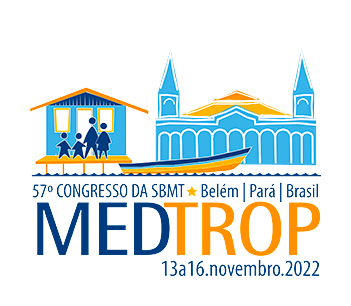Dados do Trabalho
Título
Performance assessment of a new indirect rapid diagnostic test for plague detection in humans and other mammalian hosts
Introdução
Plague is a flea-borne zoonosis that affects a wide range of mammals and still causes outbreaks in human populations yearly across several countries. While crucial for proper treatment, early diagnosis is still a major challenge in low- and middle-income countries due to
poor access to laboratory infrastructure in rural areas.
Objetivo(s)
To tackle this issue, we developed and evaluated a new Fraction 1 capsular antigen (F1)-based rapid diagnostic test (RDT) as an alternative method for plague serological diagnosis and surveillance in humans and other mammals.
Material e Métodos
The immunochromatographic test consisted of a nitrocellulose membrane impregnated with F1 antigen and a reaction control (protein A) strips. The formation of the antigen-antibody complex is revealed with a Protein A-colloidal gold conjugate. Overall, 187 sera well-characterized for anti-Yersinia pestis antibodies from 46 control rabbits, 43 humans, 44 rodents and 54 dogs were retrospectively accessed using the plague RDT method. To calculate its performance, results were compared to those obtained by traditional
hemagglutination (HA) and ELISA, which are well-established assays in the plague routine serodiagnosis.
Resultados e Conclusão
Remarkably, the results from RDT were in full agreement with those from the ELISA and HA assays, resulting in 100% (CI 95% = 95.5-100%) of sensitivity and 100% (CI 95% = 96.6-100%) of specificity. Accordingly, the Cohen’s Kappa test coefficient was 1.0 (almost
perfect agreement). Moreover, the RDT showed no cross-reaction when tested with sera from individuals positive to other pathogens, such as Yersinia pseudotuberculosis, Yersinia enterocolitica, Anaplasma platys, Ehrlichia canis and Leishmania infantum. Although preliminary, this study brings consistent proof-of-concept results with high performance of the Plague RDT when compared to HA and ELISA. Although further human and animal population-based studies will be necessary to validate these findings, the data presented
here show that the plague RDT is highly sensitive and specific, polyvalent to several mammal species and simple to use in field surveillance or point-of-care situations with instant results.
Palavras-chave
Plague diagnosis; serology, rapid test
Área
Eixo 11 | Infecções causadas por bactérias
Categoria
NÃO desejo concorrer ao Prêmio Jovem Pesquisador
Autores
Matheus Filgueira Bezerra, Wagner José Tenório Santos, Igor Vasconcelos Rocha, Natalia Rocha Nadaes, Filipe Dantas Torres, Osvaldo Pompilio de Melo Neto, Marise Sobreira, Edmilson Domingos Silva, Alzira Maira Paiva Almeida, Christian Robson Souza Reis
